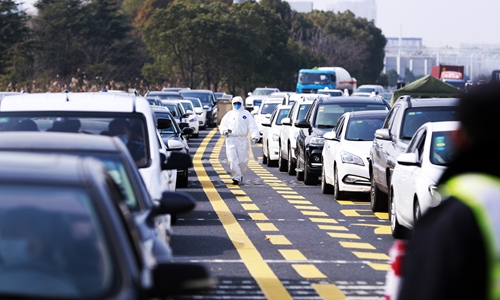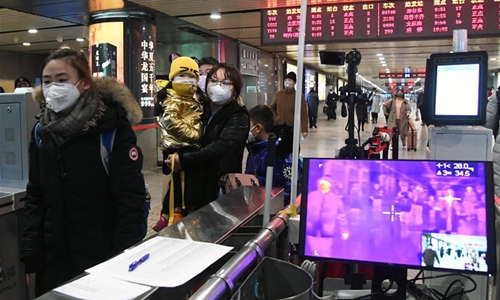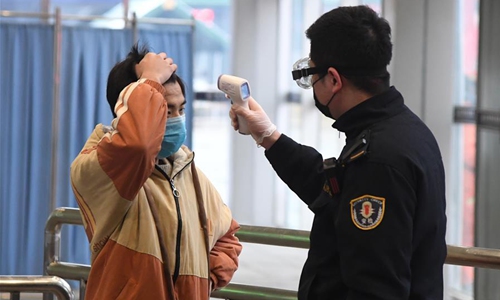China braces for work restart
Xi inspects virus prevention and control work in Beijing

Vehicles line up for inspection at a public security checkpoint on the Shanghai-Chongqing expressway. The Shanghai government has introduced a range of measures seeking to contain the spread of the virus as people return to the city from their Spring Festival holidays. Under the measures, every vehicle and person must be checked. Photo: cnsphotos
Fully gear up, keep a certain distance in the subway and canteens, check body temperature before entering the office building and less talk when lining up… Chinese people found out their work style has completely changed after the extended Spring Festival holidays while the spread of coronavirus has reshaped their lives and more people are struggling to pull through the difficult time.
The whole country, struck by the deadly novel coronavirus pneumonia (NCP) during the Spring Festival holidays, pressed the pause button. People in the world's second-largest economy were asked to stay indoors as much as possible to implement self-quarantine as a way to contain the spread of the disease while empty streets and shops, as well as deserted business centers indicated a sluggish economy in coming months.
To cooperate with epidemic prevention and control work, central and local authorities in different provinces and municipalities have also extended the holidays, suggesting employees from virus-stricken regions delay their plans to return to work. Monday marked the first day of work after the holidays for many places across the country.
In Shanghai, one of the financial centers in Asia, more people appeared on the streets on Monday morning, which had been almost empty for weeks due to travel restrictions and quarantine measures.
Shenzhen's once bustling subway trains appeared to be less crowded on Monday morning as some companies suggested their employees work from home. Some factories could not restart operation as local authorities have come up with strict hygiene requirements for labor-intensive industries to restart operations.
Disinfectant, protective outfits, thermometer and face masks are now must-have products before the factory resumes operations. "The first thing we do before entering the factory is check our body temperature. After such a long and special holiday, I have mixed feelings," Liang Zhenyuan, a 27-year-old employee at a Dongguan-based toy factory which makes Super Mario race car toys for export to the US, told the Global Times on Monday.
Due to the epidemic and some lockdowns in the city's most-hit areas, some workers could not return to Dongguan, South China's Guangdong Province on Monday, and the resumption rate of the factory was about 34.5 percent, Liang noted. "As we are an export-driven business, the epidemic caused production delays, making our delivery process much more urgent now," he said.
Dongguan, along with cities like Suzhou, a city in East China's Jiangsu, and Zhengzhou in Central Henan are major manufacturing hubs in the world's second-largest economy. The delay in production amid the NCP outbreak is also heavily weighing on the global supply chain as the virus has spread faster than SARS with an uncertain economic impact.

Passengers' body temperatures are checked at the exit of Beijing West Railway Station in Beijing, capital of China, Feb. 2, 2020. Chinese authorities have tightened measures to battle the novel coronavirus epidemic as a growing number of people hit the road and return to work after the Spring Festival holiday. Photo: Ren Chao/Xinhua
Stricter measures
To ensure public health safety, public transport junctions, office buildings, factories and industrial parks across the country have implement a series of measures such as body temperature checkpoints, collective quarantine observation points and information registration desks as part of efforts to contain the spread of NCP while making sure that work resumes.
On Monday morning, a Global Times reporter saw few people entering the Kerry Center, an office building located in Jing'an district in Shanghai. In the lobby, temperature checkpoints have been set up to make sure every person entering the building has a normal body temperature.
"Even if we work in the same office or the same building, we still use the teleconference system for our meetings," Song Wei (pseudonym), who works for a communication operator in Shanghai, told the Global Times on Monday. He also noted that the company's staff also learned from popular online protective measures like using tissue to touch the elevator button, and the canteen in his office building remained closed. Most of his co-workers brought their own food.
Temperature checkpoints have also been set up at nine railway stations in Shanghai, while local authorities have come up with timely emergency response plans, including building a local Huoshenshan-like hospital, with analysts forecasting that further outbreaks of NCP could occur in first-tier cities like Beijing and Shanghai as more migrant workers return to work. Huoshenshan was a special hospital built in Wuhan in 10 days amid the outbreak to receive NCP patients.
Emergency medical rooms are under construction in the Shanghai Public Health Clinical Center, which is the designated hospital to treat all coronavirus-infected patients in Shanghai.
"It has been about four days since construction began, and we have to finish it within 20 days," a worker at the site told the Global Times.
Authorities in Beijing also noted on Monday that the capital city has entered a crucial moment in NCP prevention and control work, and people who come back from the most-stricken areas should impose self-quarantine before returning to work.
Xi Jinping, general secretary of the Communist Party of China Central Committee, on Monday inspected the NCP prevention and control work in Beijing, according to the Xinhua News Agency.
Such full-fledged efforts also reflected the top-down determination to contain the epidemic while creating possibilities for resuming work as soon as possible, analysts said.
Containing the virus or resuming work is not a simple choice for China. These big cities have not completely restored normalcy as people found on the first day back of work that traffic or dining conditions are not the same.
With a large number of people returning to megacities, the resumption of work will test the city management and control capability in the next two weeks. Analysts warned that if prevention and control work fails, cities would waste all previous efforts.

A staff member measures temperature for a passenger at Beijing West Railway Station in Beijing, capital of China, Feb. 2, 2020. Chinese authorities have tightened measures to battle the novel coronavirus epidemic as a growing number of people hit the road and return to work after the Spring Festival holiday. Photo: Ren Chao/Xinhua
Confidence strengthened
"The winter will always end as spring comes," said a 30-something young woman who is still waiting for her hometown, Yichang, a city in Central China's Hubei, to lift the city lockdown so she could fly back to Beijing where she works.
Before the coronavirus outbreak, people took many things for granted, such as shopping with friends, talking to co-workers during lunch break, going to see a movie or having a drink after work, which have now become unattainable as people have to keep a distance to avoid possible infection.
The number of new confirmed cases reported daily in provinces outside Hubei dropped for the sixth consecutive days on Sunday, showing that nationwide prevention and control work are making progress, which also strengthened the confidence of workers, who are expecting their lives to return to normal soon.
"I believe that our country could get through this difficult time, as there are so many people fighting on the frontline. Though we face a difficult time for the moment due to staff shortage and supply chain blockages, things will get better," a Yiwu-based factory owner who makes clothing and accessories for US retailers such as Gap told the Global Times on Monday.
The factory has to do everything to meet local authorities' requirements in work resumption, as further delays would also affect the whole year's orders, she said.
Xiao Sai, a Chongqing resident, told the Global Times that the city witnessed much more traffic on Monday as many returned to work.
"Heavy traffic and crowds are now not a source for headaches for morning commuters, but shows that the country is prospering and the people are at peace," she said.